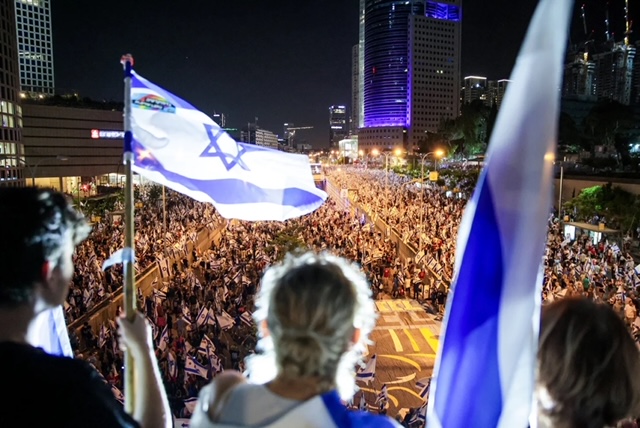The summer interlude is coming to an end. In Israel, there was no pause, neither in the offensive of the ruling coalition nor in the opposition it arouses. Citizen mobilisation continued throughout the summer. Each Saturday night, Israelis opposed to the judiciary coup demonstrated in the streets in Tel Aviv, and in at least 150 gathering places across the country. The protest is not limited to the “left“ which would be unable to bring so many people together—between 200 000 and 300 000 during the last weeks. Nor is it the fact of “The State of Tel Aviv”. It is in all social strata and on the whole territory that are recruited the opponents of the regime change to which the current coalition aspires and that it advances in mute, in parallel with the laws that it intends to pass.
Indeed, the societal shock promoted by the coalition goes far beyond the legislative measures taken and in preparation. It is also embodied in administrative measures, in the behaviour of individuals and institutions that feel that “the moment has come”. For example, on Friday, August 25th, the Ministry of Education published lesson plans and guidelines that encourage teachers to deal with controversies and divisions in Israeli society. One imagines the content of these guidelines when one knows that the acting deputy director general of this ministry was in charge of education in the Kohelet forum, a think tank of American Jews that has been preparing for years this conservative revolution that the current government is setting up in Israel.
It should also be noted that this same ministry excluded a few weeks ago the Israeli-Palestinian Forum of Bereaved Families from extra-curricular programs allowing it to intervene in high schools in front of the students of terminal classes. Indeed, nothing is more dangerous than this NGO, which refuses hatred and the spirit of revenge, often offering young Israelis the only opportunity to meet Palestinians and hear a narrative of reconciliation.
With regard to the individual behaviour of people with a certain amount of power—bus driver, guard, security officer—incidents have multiplied in recent weeks, calling into question the position of women in the public sphere. They were denied entry, because of their dress, to a mall or forced to sit at the back of the bus—… Agents of morality of a police of morals that is insidiously set up reveal themselves in the open. These incidents have, in response, strengthened the protest movement, and not only among women.
In the occupied territories, the situation is getting worse and worse. The increasing number of bloody attacks – there have been as many Israelis killed since the beginning of the year as during last year, in spite of promises of security by right-wing activists when they were not in business) —, give rise to punitive expeditions against Palestinians enjoying a guilty laissez-faire, although condemned verbally. The development of settlements and the enormous budgets vested in them (the recent allocation of more than 700 million shekels) will only fuel tensions and reinforce a de facto annexation that weakens Israel’s international positioning. Proof of this is the condemnation by the United States of the words of the Minister of National Security, Itamar Ben Gvir (whose name was rarely mentioned in the official statement) as being “racist”, following his statement that “the right of Jews to move and live safely in the West Bank outweighed the freedom of movement of Arabs. This statement, that Netanyahu has neither criticized nor condemned, is the greatest gift this government has given to all those who have called Israel an apartheid state for years. When the Jewish supremacist vision of a settler becomes the position of a government minister, it is not Israel that occupies the territories, but the occupation that extends to Israel.
The next weeks will probably mark an important step in the coalition’s attempt to finalize its plan to transform the nature of the State of Israel, as well as in the mobilization of civil society to oppose it. Starting on September 12th, The Supreme Court will have to rule on 4 appeals filed by civil society actors against laws already passed or government bills.This will be an opportunity for some to resume their attacks on this institution to weaken it or curb it, and for others to mobilize more vigorously to support this unique counter power.
These actions relate to the “law of reasonableness” passed in July which prohibits judges from using the legal concept of “reasonableness” to invalidate—or even discuss—the decisions adopted by the government, on the conditions of unfitness of a Prime Minister to exercise his office, on the non-compliance with the conflict of interest agreement which obliges the Prime Minister not to get involved in the legislative process of judicial reform which could affect the conduct of proceedings against him, and finally, on the meeting of the Commission for the Appointment of Judges, which Yariv Levin, the Minister of Justice, refuses, until he has ensured that he can appoint politically “safe” judges.
These appeals will revive debate and controversy over the status and nature of the Supreme Court, at the heart of the judicial coup initiated by the extremist ruling Coalition. The leaders of the protest are fully aware of the challenges of this new parliamentary year and are preparing for them.
We, for our part, will organize, together with La Paix Maintenant, on September 20th a videoconference meeting in order to learn about the latest developments and see how to mobilise ourselves better besides Israelis living abroad in order to oppose that legal coup (register on by clicking HERE).
As for Rosh Ha Shana, we may only hope that the Israeli society will find in all its diversity the forces needed to confront that threat to it and that it will remain faithful to the vision of its founding fathers of a Jewish and democratic State. Shana tova to you and your loved ones.
David Chemla and Ilan Rozenkier






